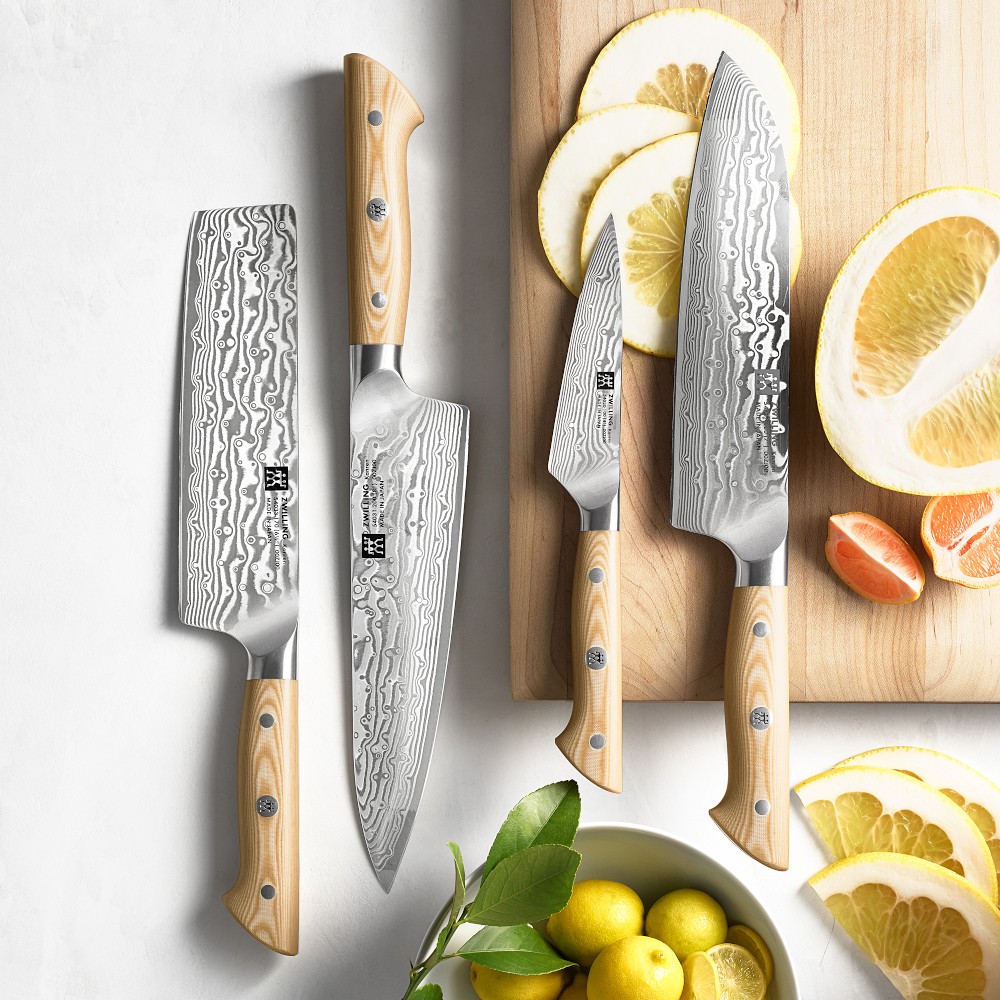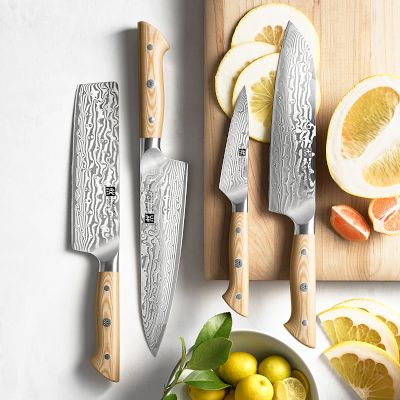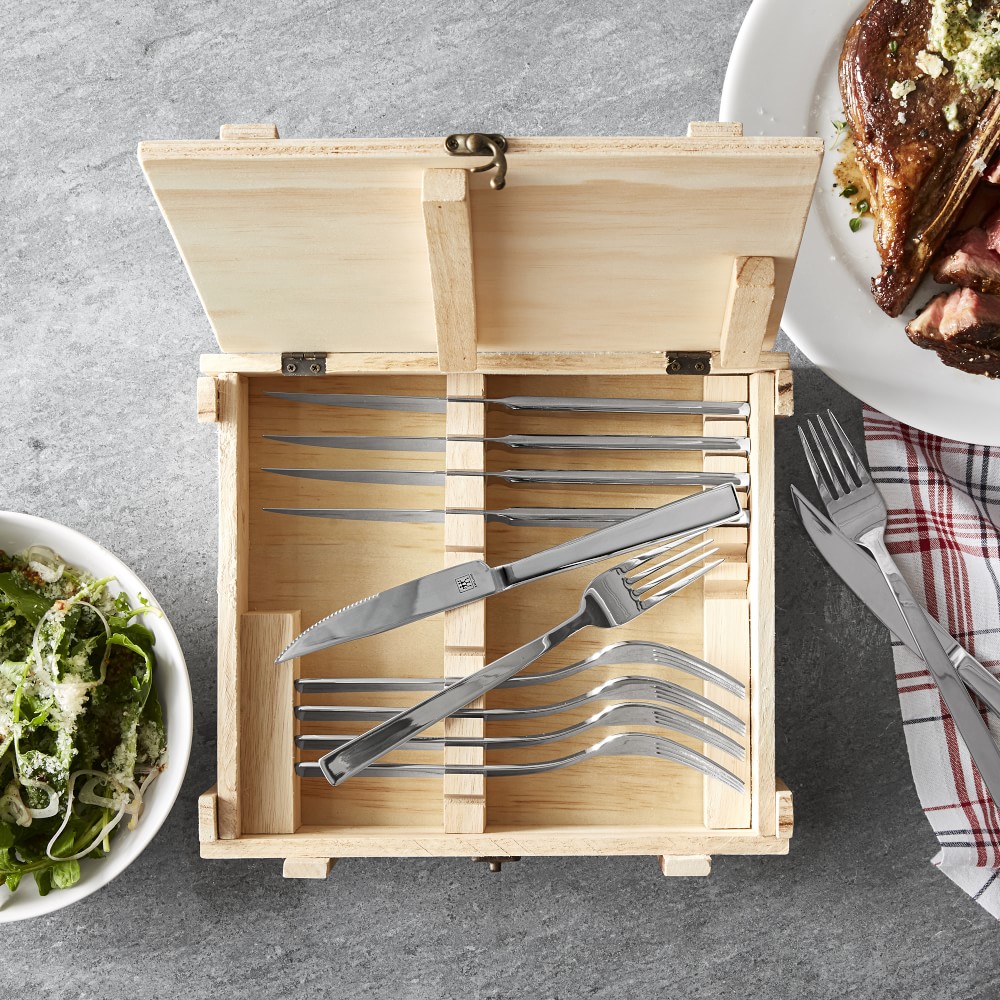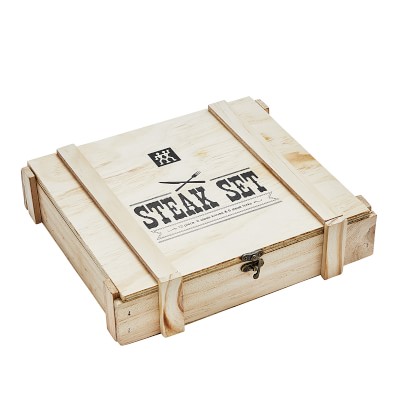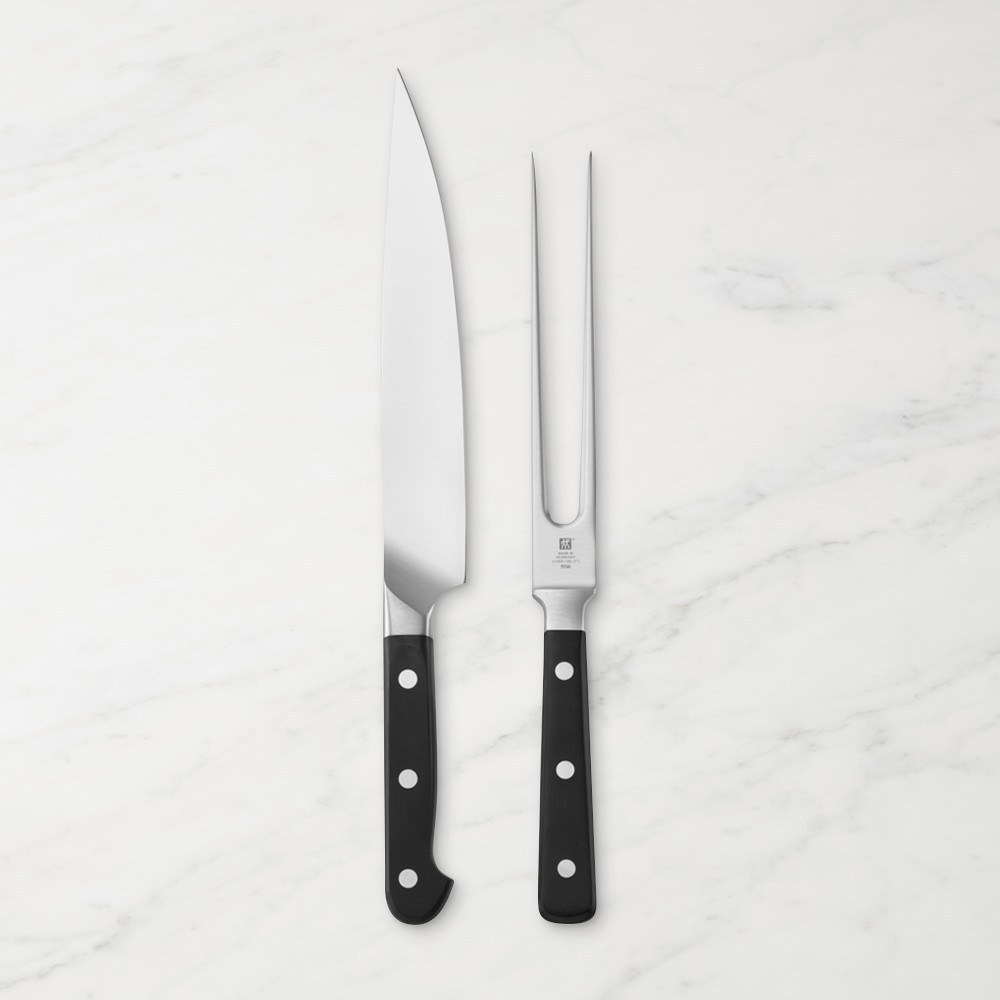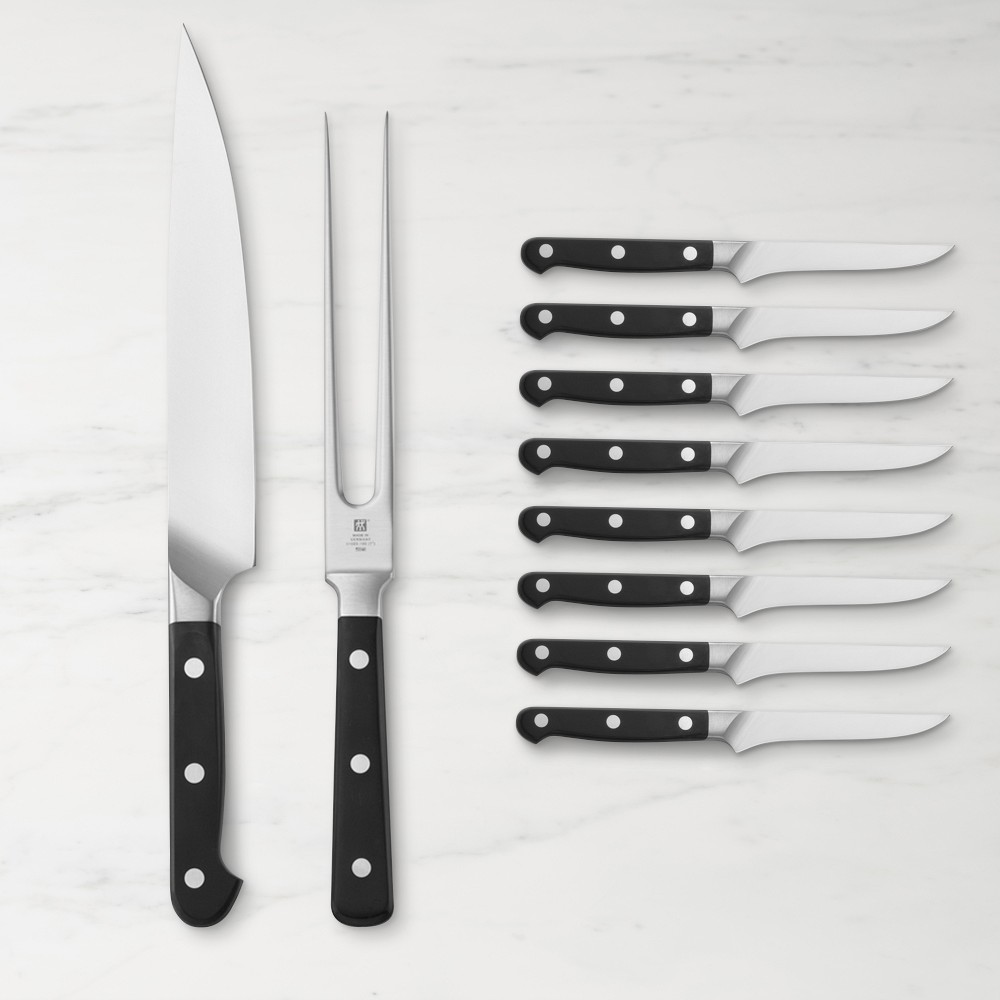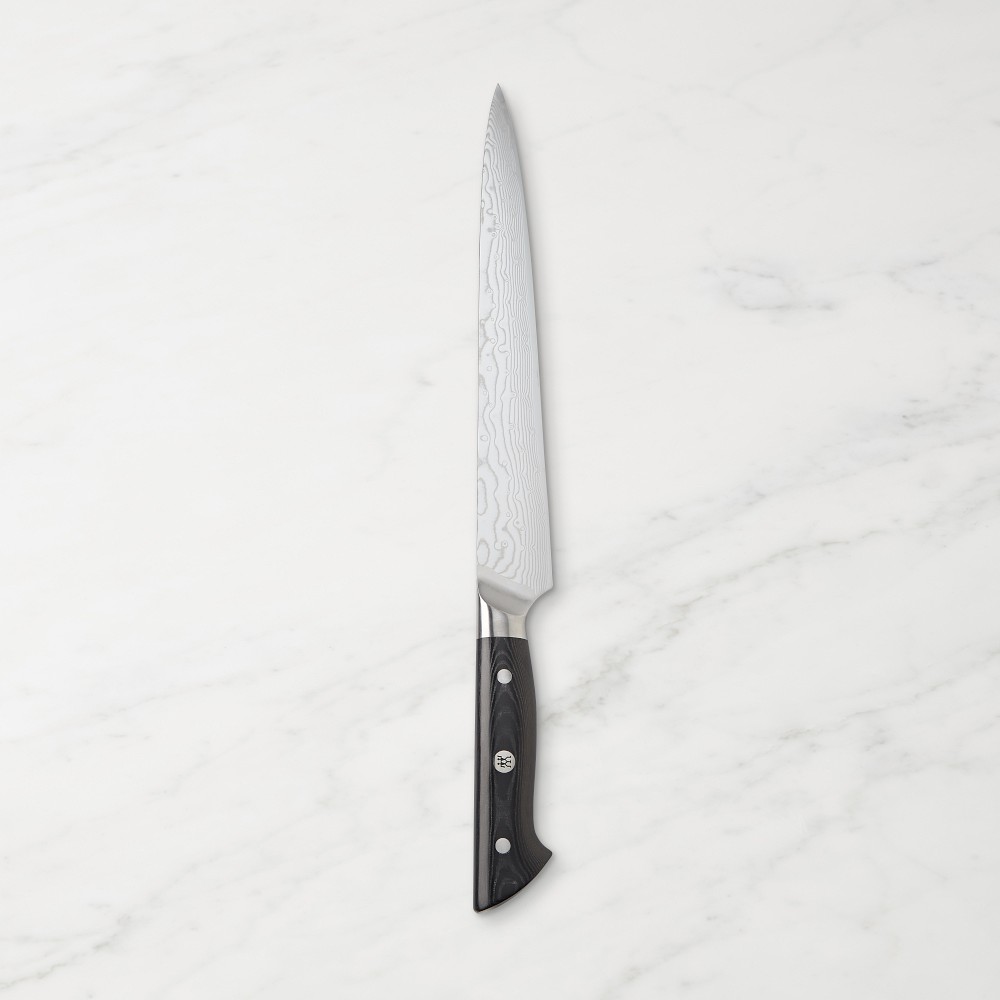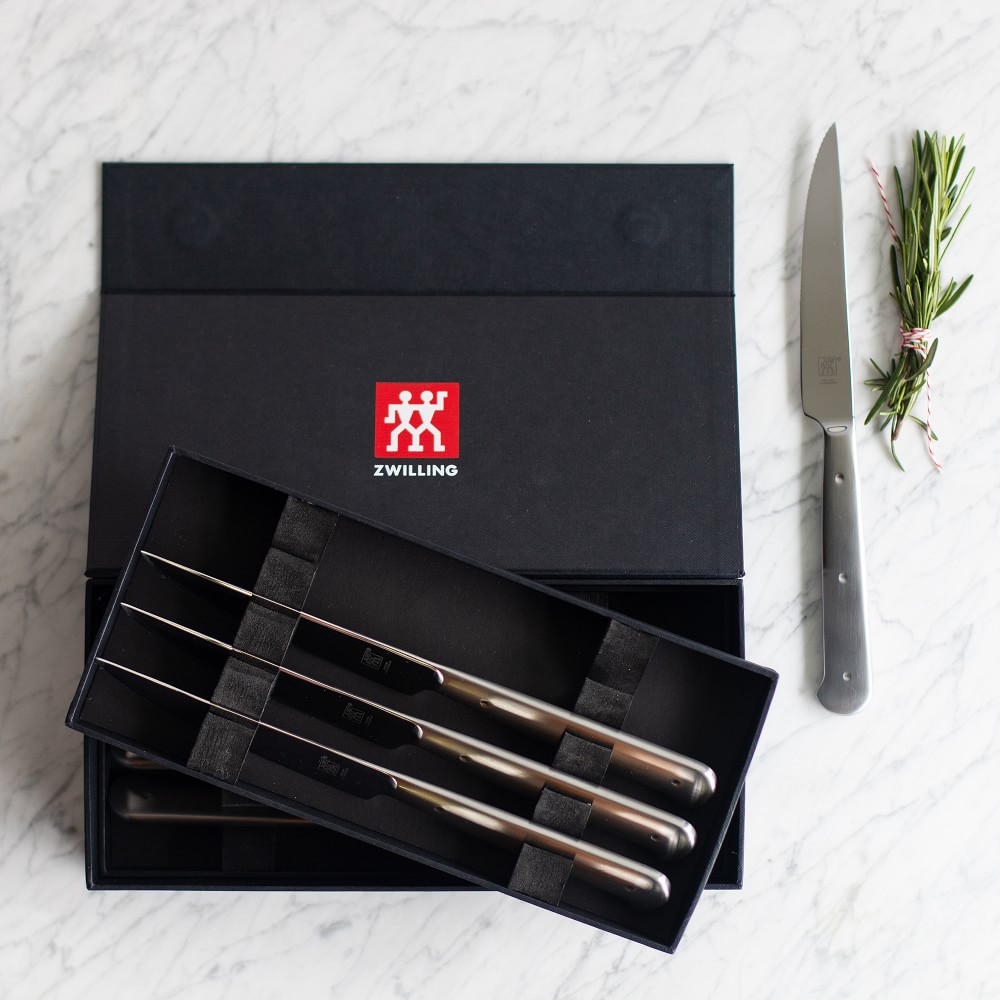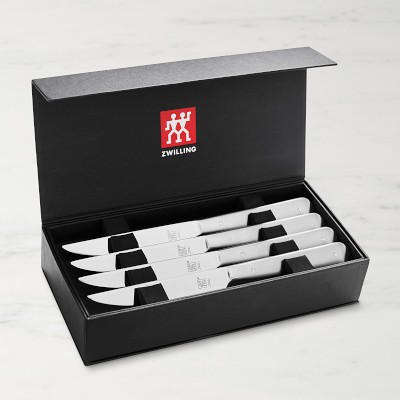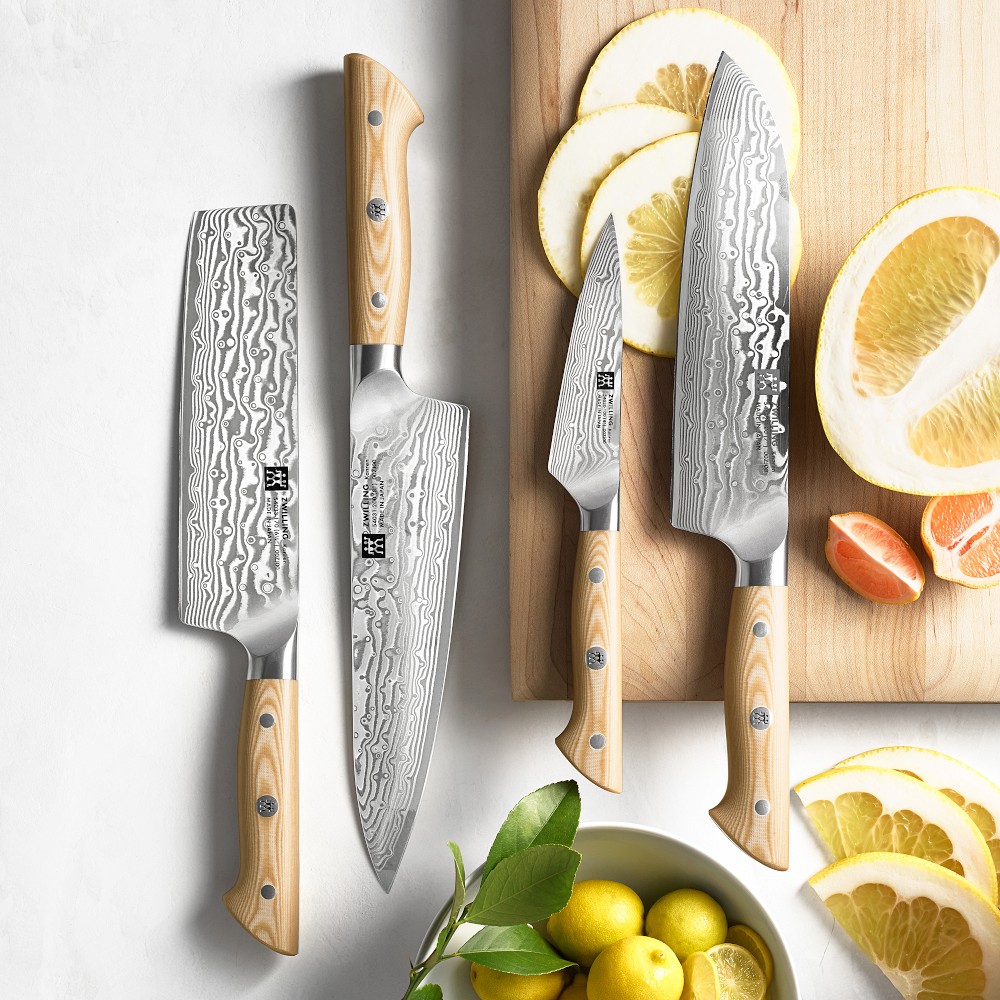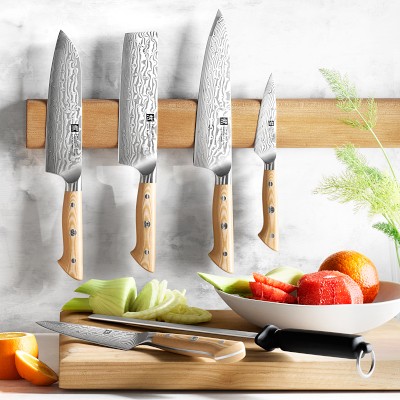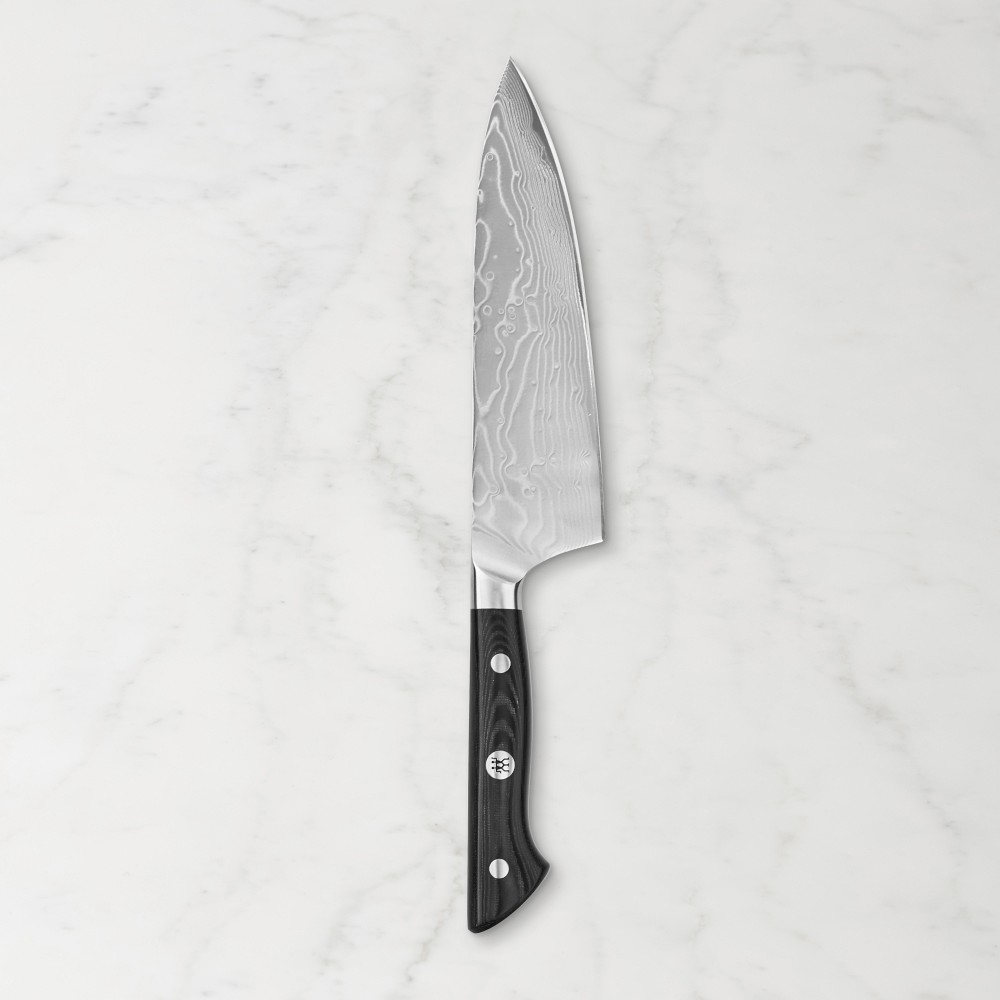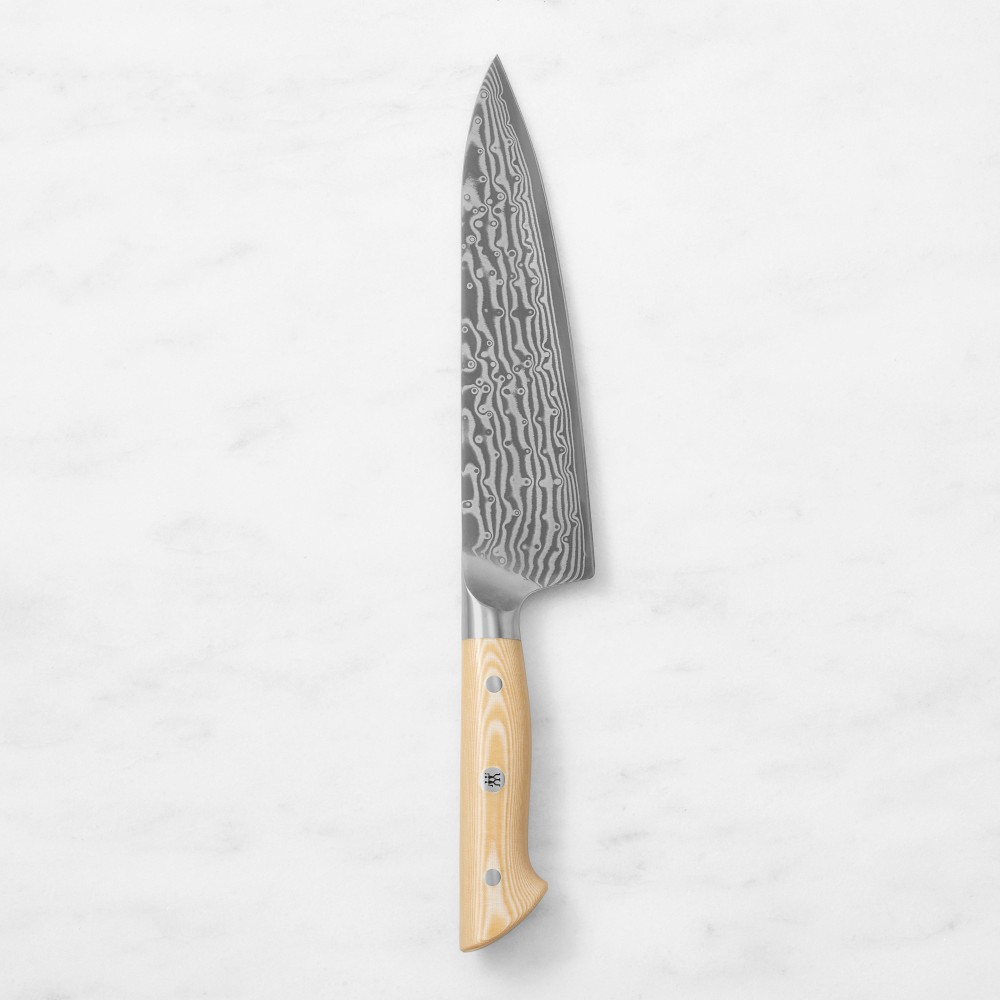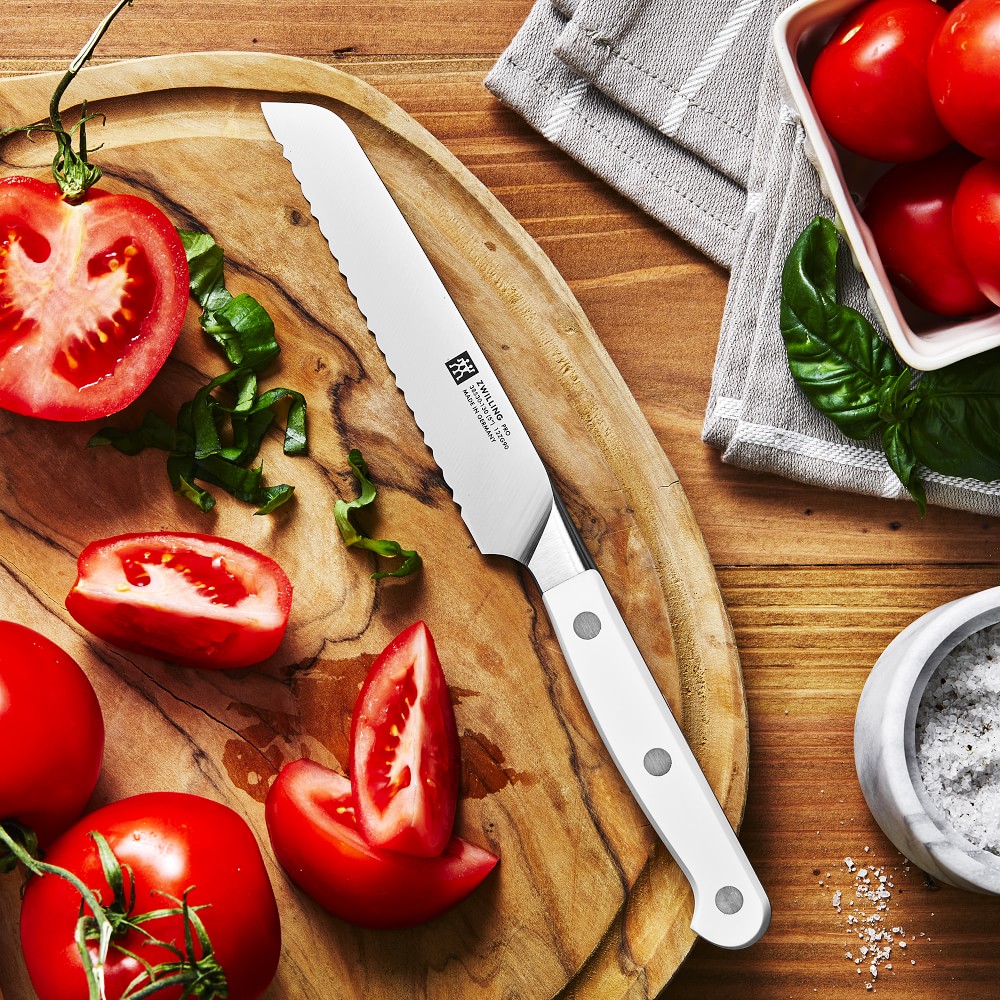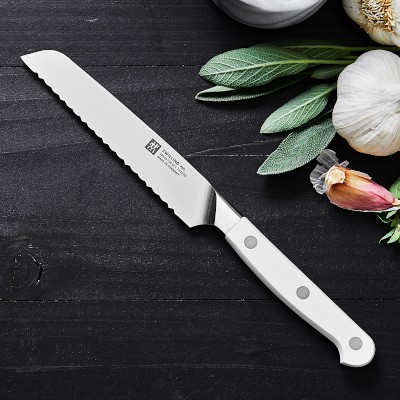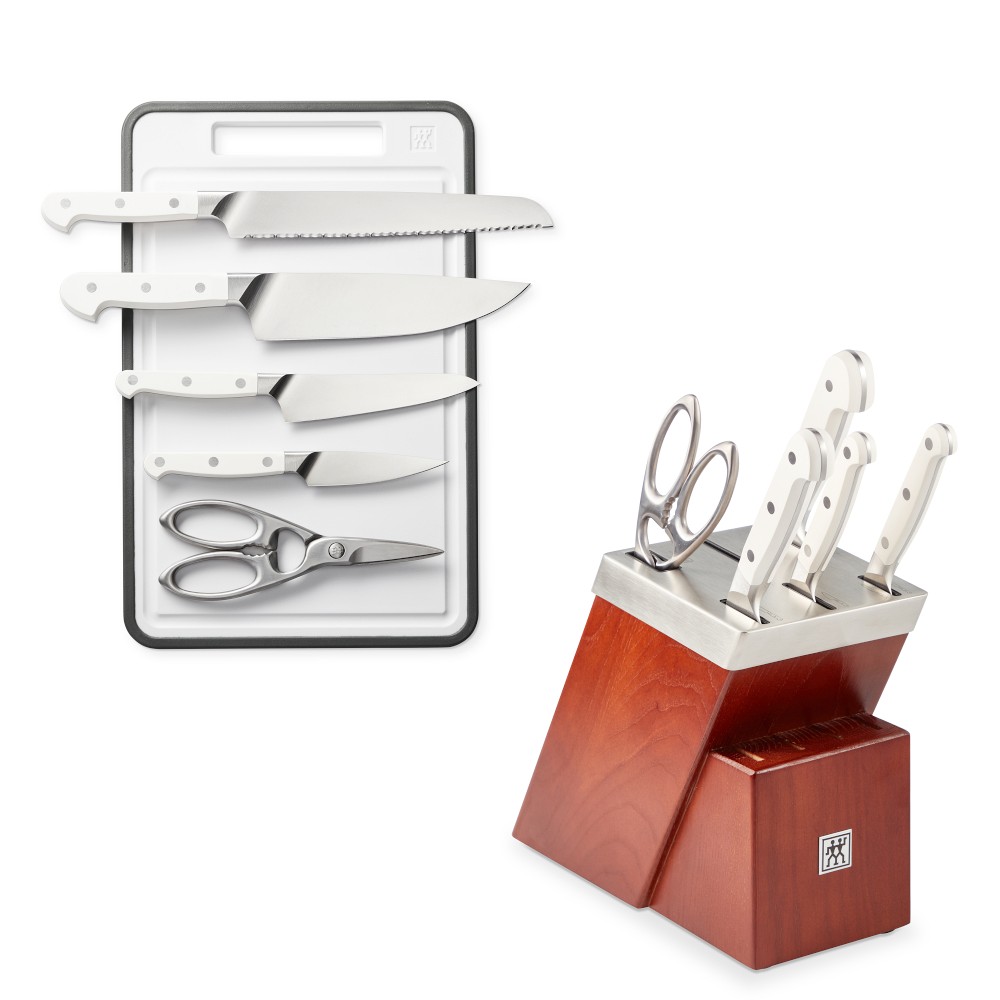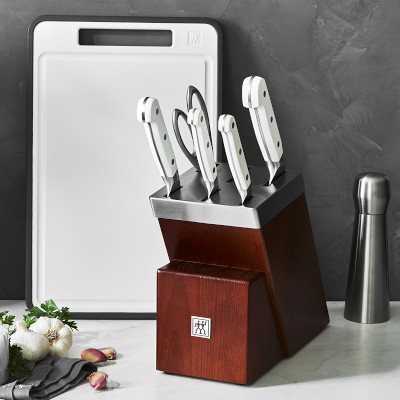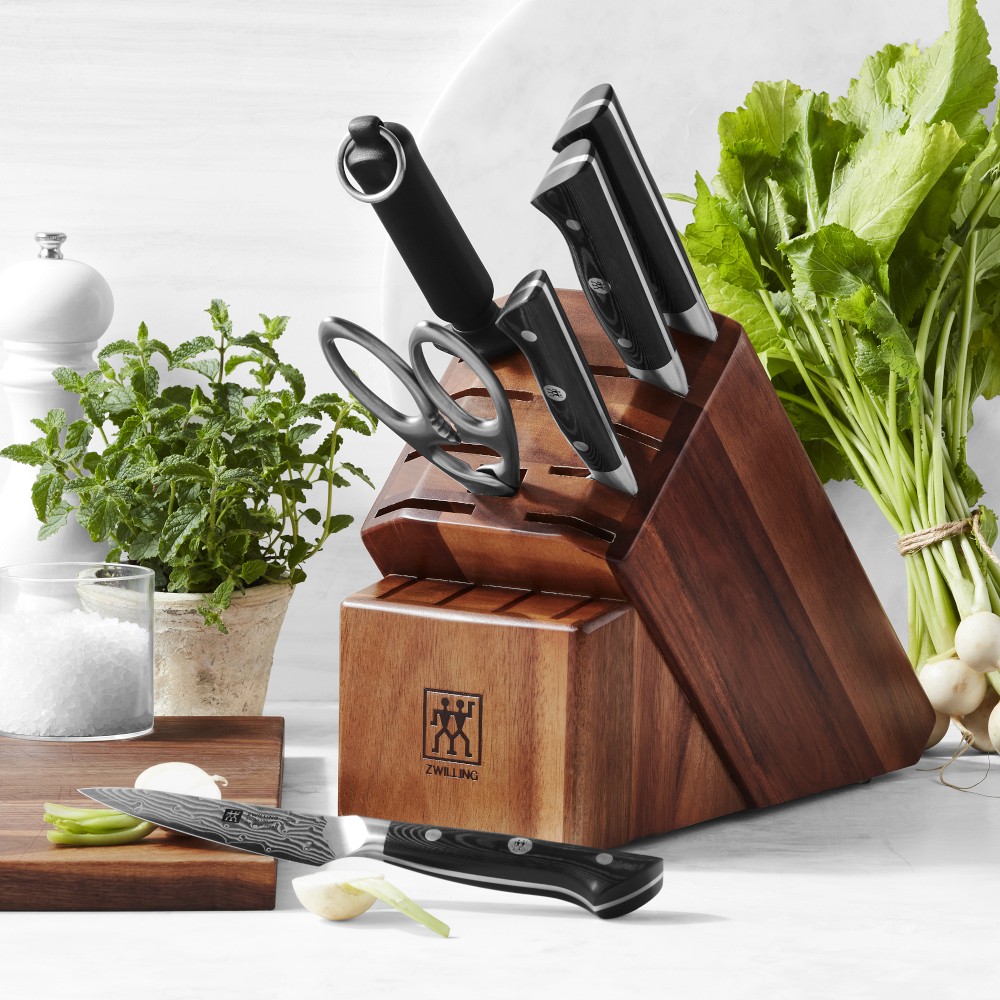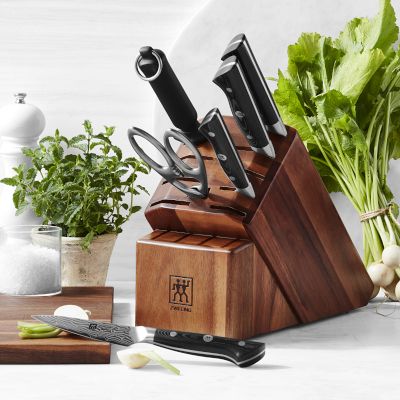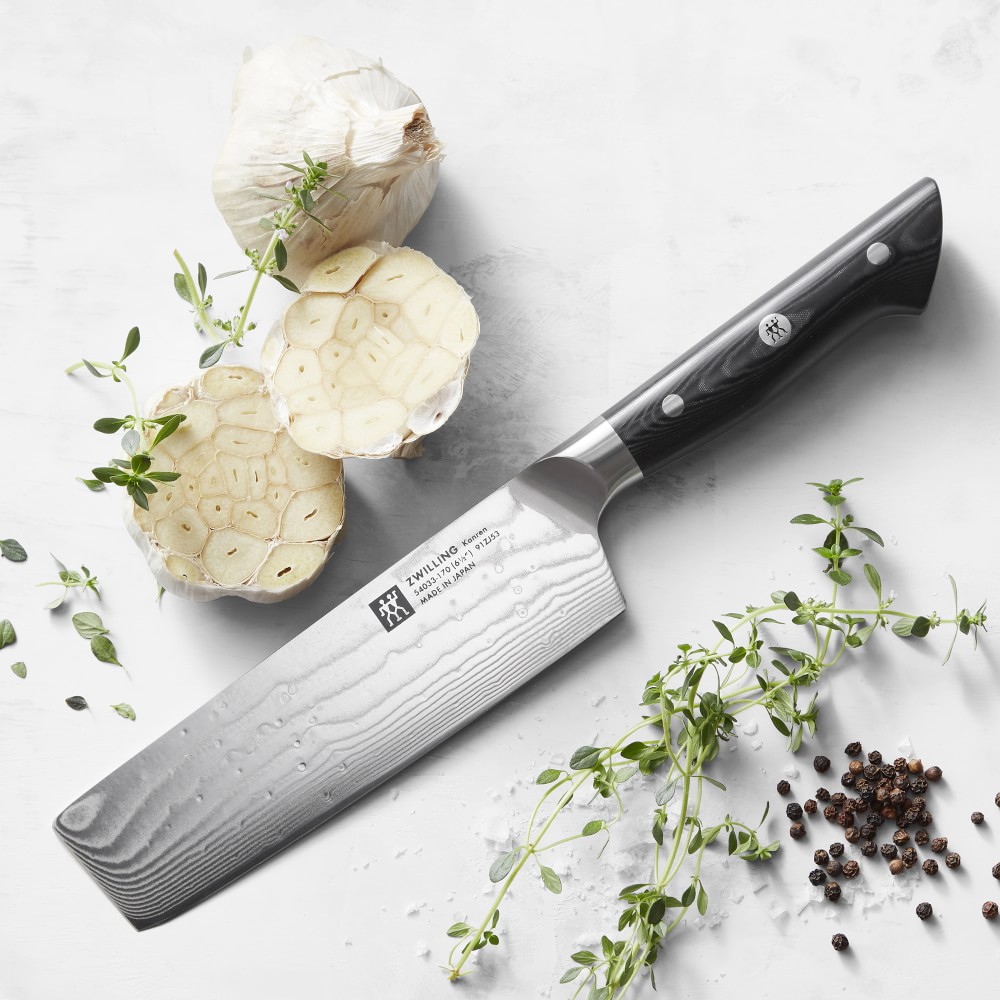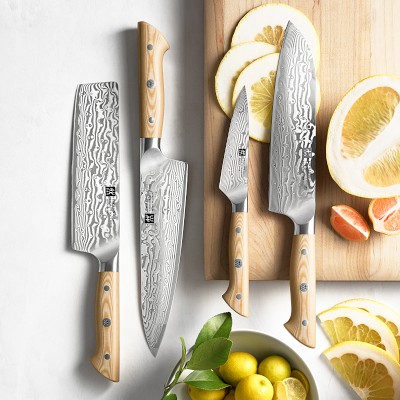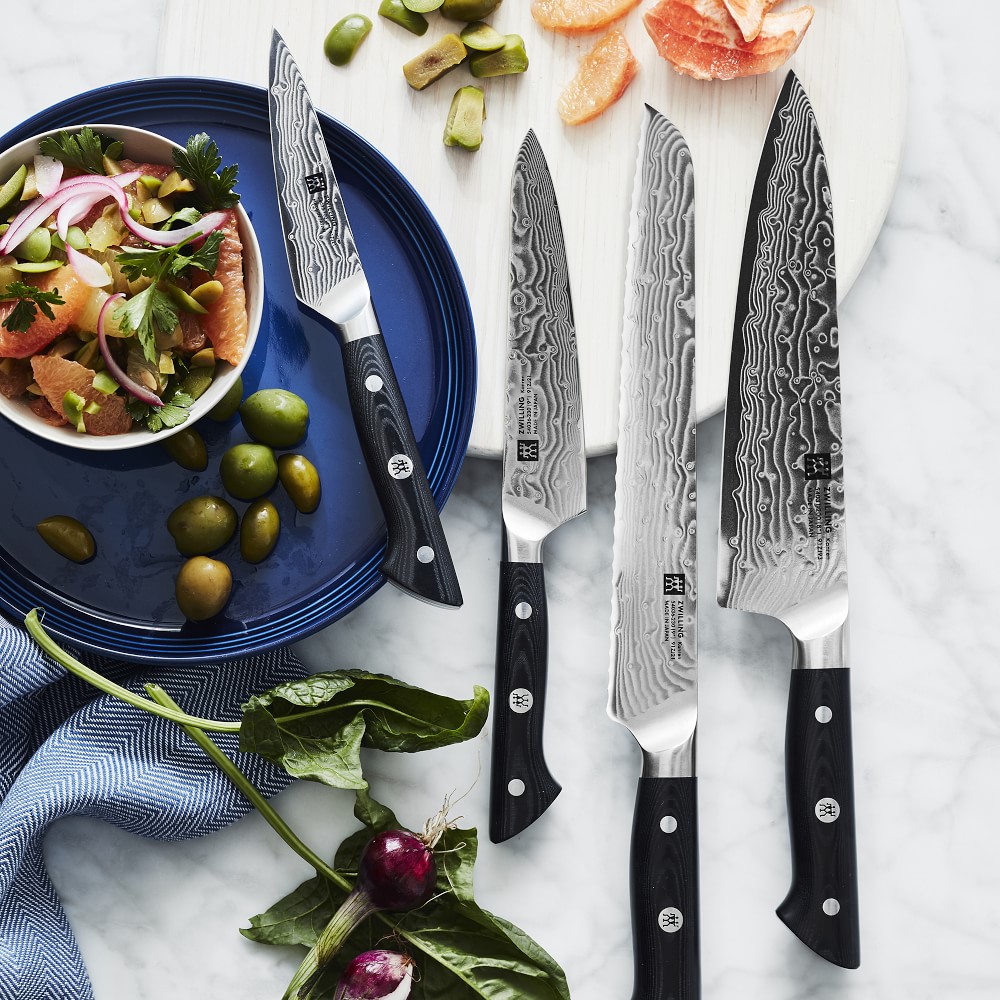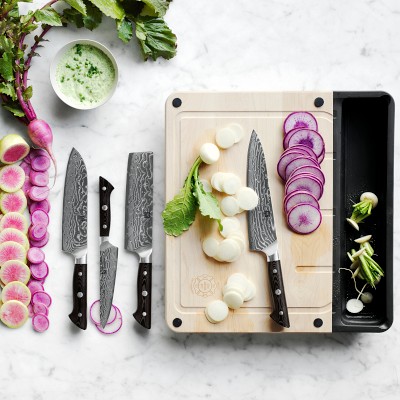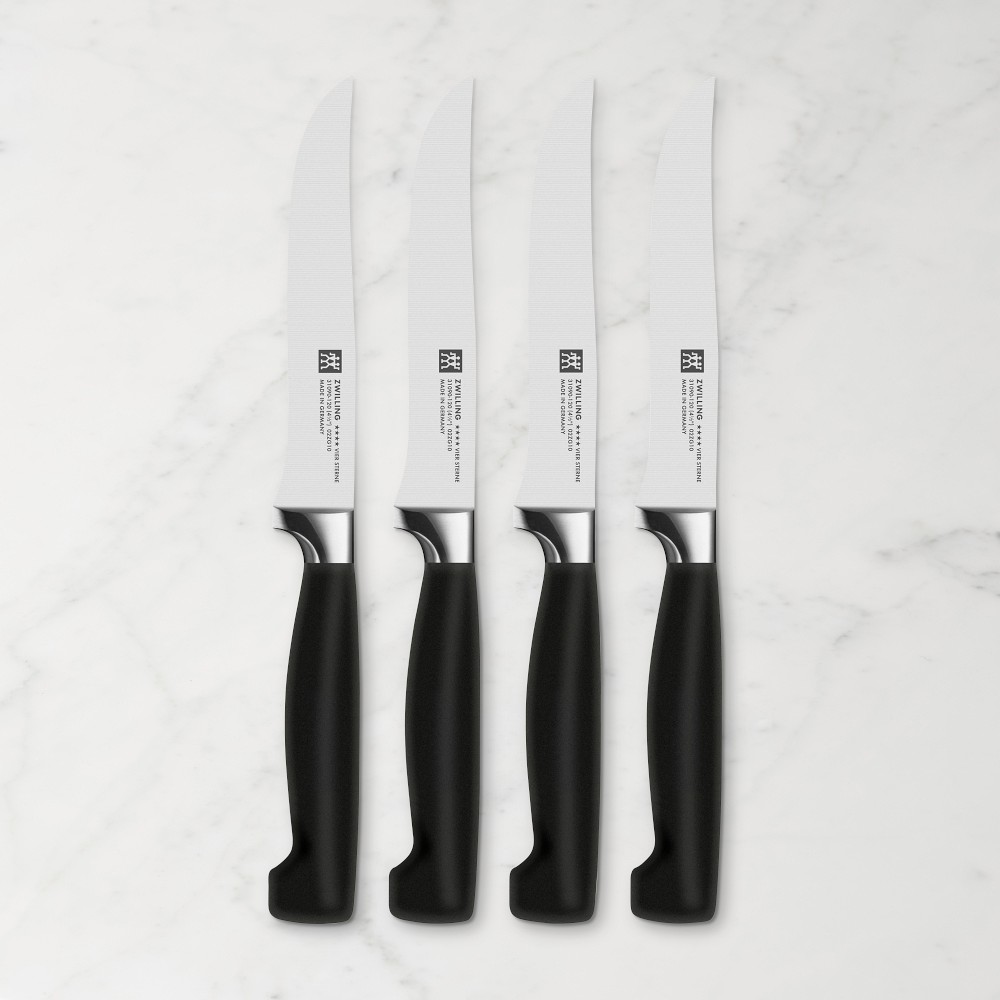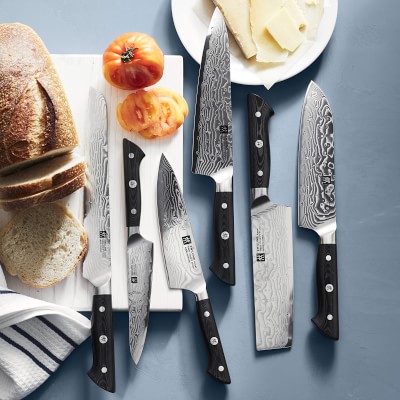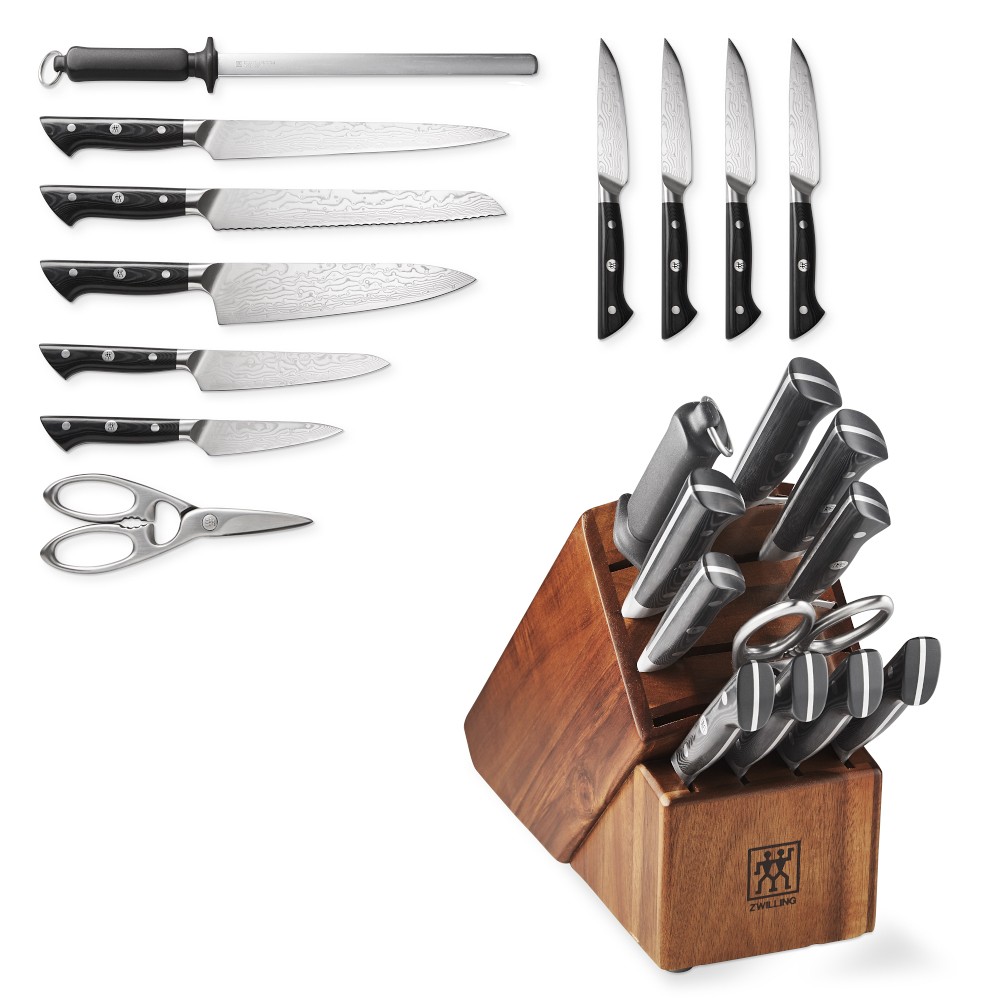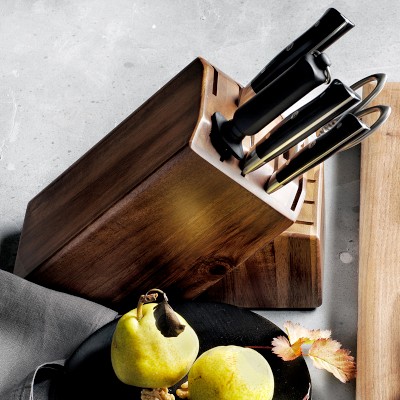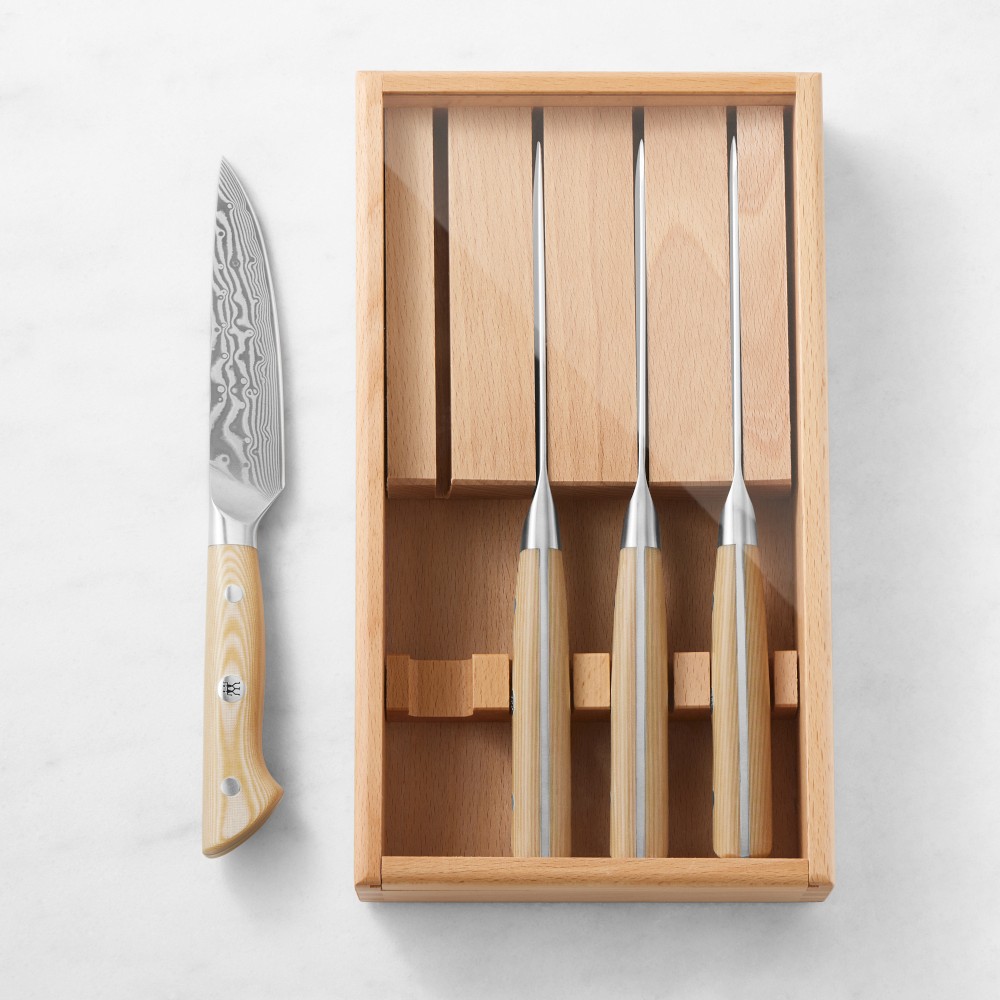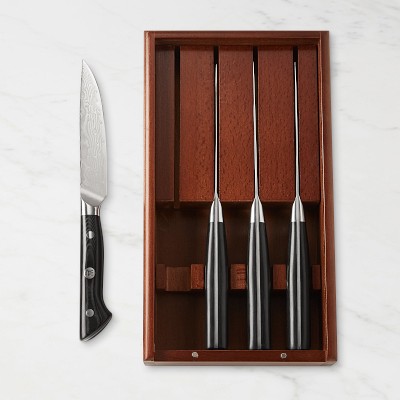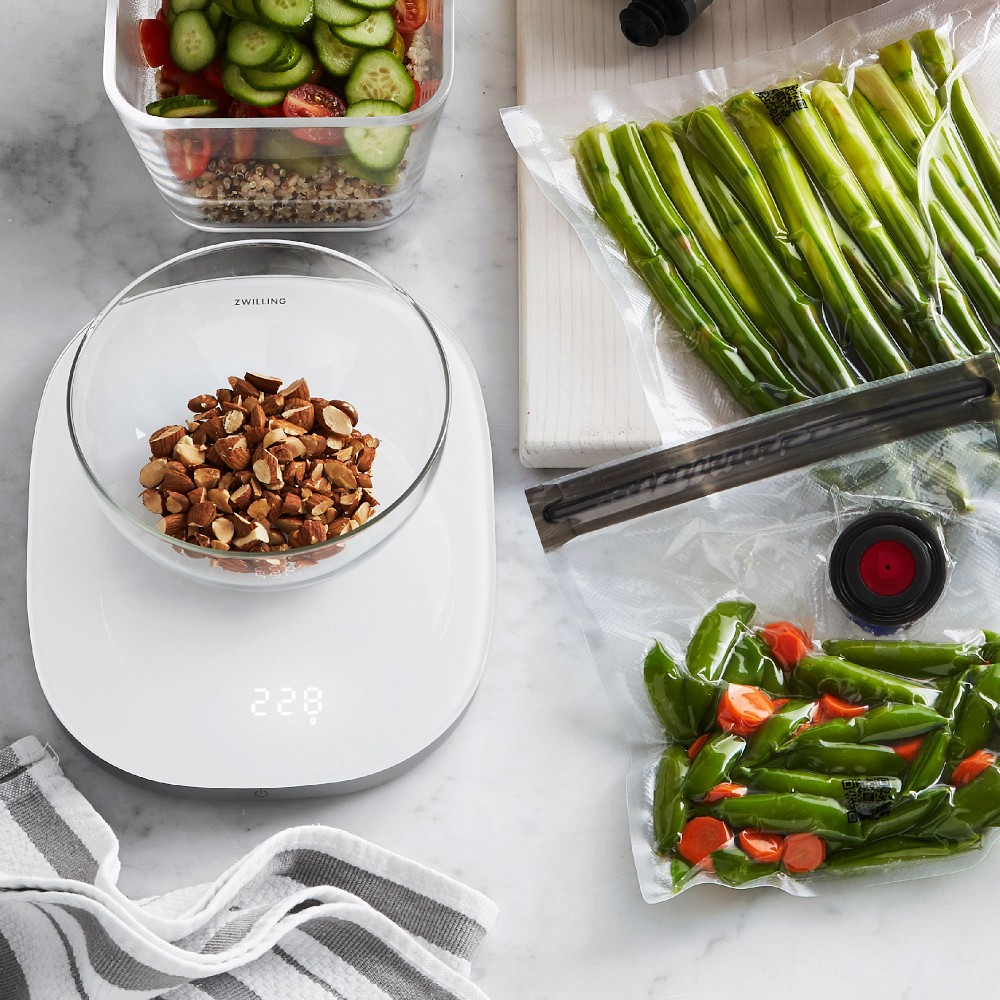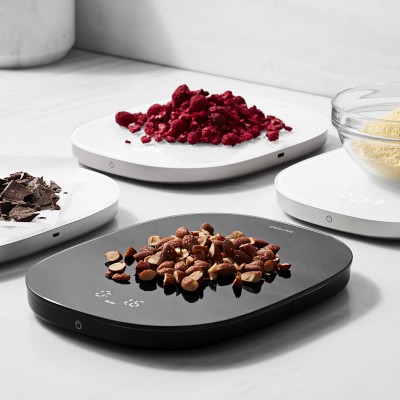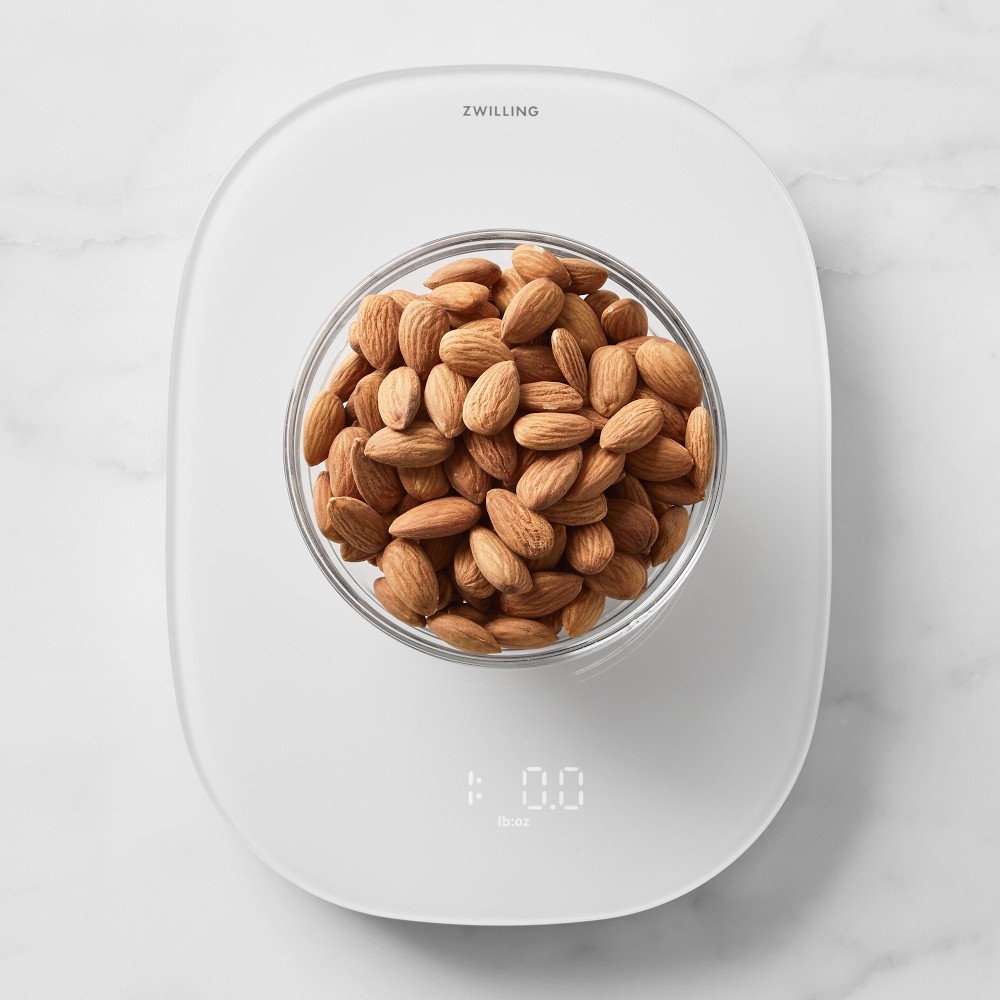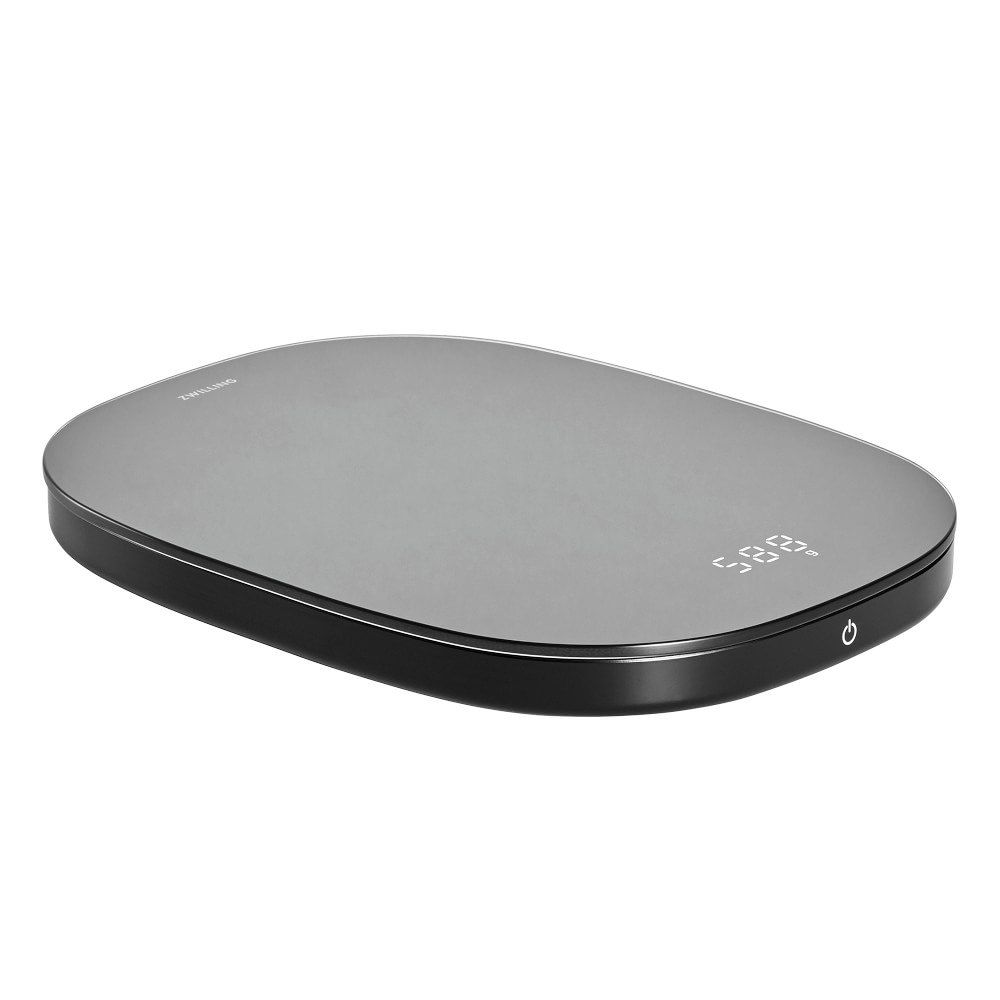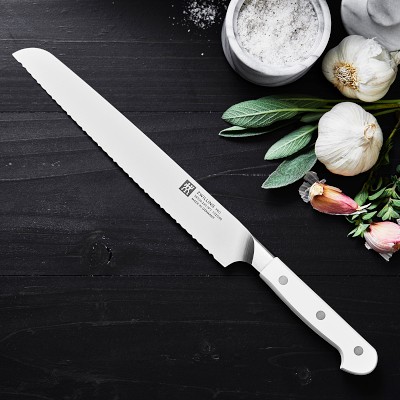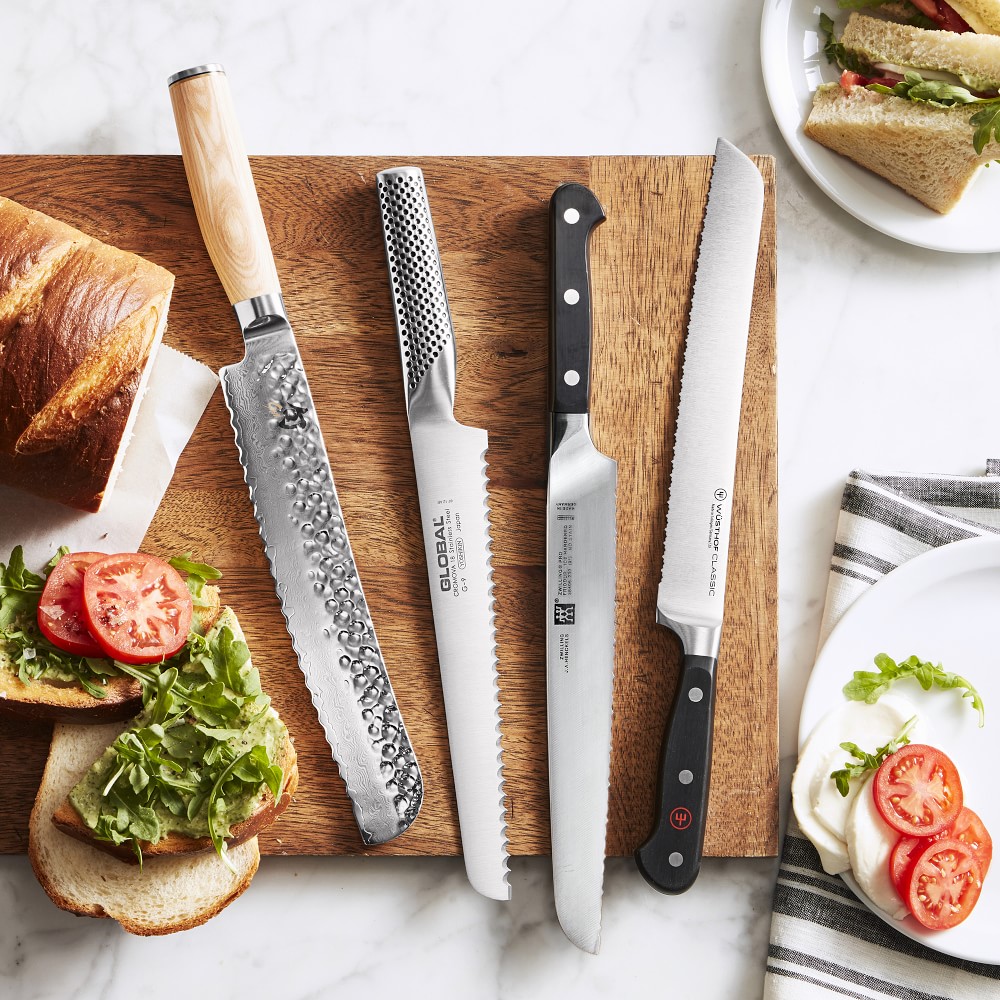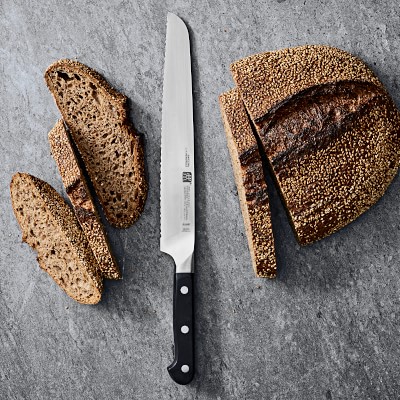-
Detail
Summary
Named for the Japanese word for "connection," the Zwilling Kanren Kiri collection celebrates the bond formed while cooking and eating together. Uniting German engineering and Japanese craftsmanship, each 48-layer Damascus-style blade is forged from high-performance carbide stainless steel and hand honed using the three-step Honbazuke process. Triple-riveted blonde Micarta handles feature Zwilling's signature curved bolster, promoting a secure grip and comfortable, fatigue-free cutting.
- Each 48-layer Damascus-style blade is hand honed in high-performance FC61 fine-carbide stainless steel for exceptional resistance to corrosion, stains and chips.
- Zwilling's signature curved bolster and Micarta handle are ergonomically designed for safe, comfortable handling.
- BPA-free.
- Handcrafted in Seki, Japan.
- Steak knives sold as set of 4.
- 2-piece starter set includes 4" paring knife and 8" chef's knife.
- 7-piece set includes 4" paring knife, 5 1/2" prep knife, 8" chef's knife, 9" bread knife, kitchen shears, diamond sharpening steel and 12-slot acacia storage block.
Dimensions & More Info
- Paring Knife: 4" blade, 4 1/2" handle; 3.9 oz.
- Steak Knife (4): 4 1/2" blade, 4 1/2" handle; 4.1 oz.
- Prep Knife: 5 1/2" blade, 4 1/2" handle; 4.3 oz.
- Nakiri Knife: 6 1/2" blade, 4 3/4" handle; 8 oz.
- Santoku Knife: 7" blade, 4 3/4" handle; 7.8 oz.
- Chef's Knife: 8" blade, 4 3/4" handle; 7.7 oz.
- Bread Knife: 9" blade, 4 3/4" handle; 7.2 oz.
- Kitchen Shears: 8" long overall; 3.5 oz.
- Diamond Steel: 9" steel; 5" handle; 6.3 oz.
- Acacia Storage Block: 11 1/2" x 5" x 8 1/2" high.
- Knives are made in Japan.
- Block and steak knife storage case are made in China.
Use & Care
Use
- Always use caution when handling sharp objects.
- Avoid cutting on hard surfaces such as stone, metal or glass.
- It is not advisable to use any knife but a meat cleaver to cut through bone, as other blades can be easily damaged.
Care
- Hand-wash with warm water and mild detergent; rinse and dry immediately.
- Avoid cleaners containing bleach or citrus extracts.
- Sharpen as needed. With regular use and honing once a week, you should not need to sharpen knife more than once or twice a year.
- Sharpen bread knife at home using sharpener specifically designed for serrated blade.
- Sharpen remaining knives at home using whetstone or knife sharpener designed to sharpen between 9- and 12-degree angle, or have them sharpened by a professional.
- Store in safe place to protect edges and prevent injury.
-
Customer ReviewsNo comments
-
-
-
- Aarón Sánchez
- Aerin
- All-clad
- Anna New York
- Anyday
- Apilco
- Bake From Scratch®
- Birkenstock®
- Bissell
- Bordallo Pinheiro
- Boska
- Brabantia
- Breville
- Bridgerton
- Busatti
- Café™
- Cangshan
- Cartwright & Butler
- Casamigos
- Chef’n
- Chef’schoice
- Chilewich
- Christian Lacroix
- Coravin
- Corkcicle
- Crafthouse By Fortessa
- Cuisinart
- Cup Board Pro
- De Buyer
- De’longhi
- Demeyere
- Deshoulieres
- Disney
- Duraclear®
- Duralex
- Dyson
- Emile Henry
- Enclume
- Epicurean
- Fellow
- Finex
- Flour Shop
- Fortessa
- Fortnum & Mason
- Galaxy Desserts®
- Ge Profile™
- Global
- Goldtouch®
- Gray Malin
- Greenpan™
- Guy Degrenne
- Haden
- Harry Potter™
- Hestan
- Hold Everything
- Holmegaard
- Instant Pot
- Jean Dubost
- Jean-georges
- Jeff Leatham
- John Boos & Co.
- Joseph Joseph
- Josh Young
- Jura
- Kitchenaid®
- La Cornue
- Laguiole En Aubrac
- Le Creuset
- Lelit
- Lodge
- Lotus
- Mackenzie-childs
- Marlo Thomas
- Masaharu Morimoto
- Matouk
- Mauviel 1830
- Michel Bras
- Microplane®
- Miele
- Minted
- Miyabi
- Moccamaster By Technivorm
- Morris & Co.
- Muraglia
- Nfl
- Nespresso
- Nielsen-massey
- Nordic Ware
- Ooni
- Open Kitchen By Williams Sonoma
- Orrefors
- Oscar De La Renta
- Oxo
- Peanuts™
- Peugeot
- Philips
- Pickard
- Pillivuyt
- Rabbit
- Regalis
- Riedel
- Robert Welch
- Rory Dobner
- Rowenta
- Ruffoni
- Sanderson X Giles Deacon
- Scalamandré
- Scanpan®
- Schmidt Brothers
- Schott Zwiesel
- Shark
- Shelia Bridges
- Shun
- Silpat
- Implehuman™
- Smeg
- Smithey
- Stanley
- Stanley Tucci™
- Star Wars™
- Staub
- Stranger Things
- The George
- Traeger
- Trisha Yearwood
- Tyler Florence
- Usa Pan
- Vitamix
- Waterford
- Weber
- Wedgwood
- Wellnessmats®
- Williams Sonoma
- Woodford Reserve
- Wüsthof
- Yamazaki Home
- Yeti
- Zwilling
-
-
-
-
-
-
-
-
-
-
-
-
-
-
-
-
-
-
-
-
-
-
-
-

